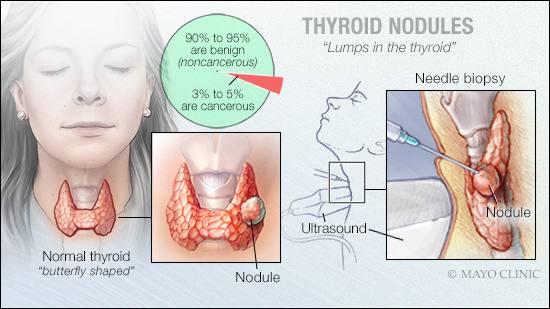-
Health & Wellness
Mayo Clinic Q and A: Understanding thyroid nodules

DEAR MAYO CLINIC: Are thyroid nodules common? What causes them to develop, and should I be concerned if I have one?
ANSWER: Lumps in the thyroid — called thyroid nodules — are common. The likelihood of having one is higher in women and increases with age. It’s estimated that up to half of adults over 50 may have one. There are various reasons why thyroid nodules may develop. Thankfully, around 90% to 95% of thyroid nodules are benign, or noncancerous. Still, follow-up to determine whether they’re benign or cancerous is important. When cancer is caught early and confined to the thyroid gland, treatment is usually successful.
The thyroid is a butterfly-shaped gland in the midline of your neck, about halfway between your Adam’s apple and breastbone. Your thyroid gland produces two main hormones: thyroxine, often called T-4, and triiodothyronine, or T-3.
Thyroid hormones affect many cells within your body. They maintain the rate at which your body uses fats and carbohydrates, help control your body temperature, affect how your nervous system works, and influence your heart rate. Your thyroid gland also produces calcitonin, a nonessential hormone that helps regulate the amount of calcium in your blood.
Thyroid nodules are solid or fluid-filled lumps that form within your thyroid. Thyroid nodules generally don’t cause any signs or symptoms. They often are found incidentally as a result of tests or radiologic exams, such as ultrasound or CT scans, performed for another medical reason. Occasionally, a nodule may first be noticed if it causes swelling in the neck, or if it’s large enough to make swallowing uncomfortable or difficult.
Nodules may develop due to an overgrowth of normal thyroid tissue. Although it is not clear why this happens, these nodules usually do not pose any health risks and don’t require treatment. Certain thyroid disorders, such as chronic inflammation of the thyroid gland or enlargement of the thyroid, can lead to nodules, too. Although the underlying condition may require treatment, the nodules themselves typically do not.
While most thyroid nodules are benign, rarely they can be cancerous. Studies have shown that about 3% to 5% of all thyroid nodules are malignant. If indicated based on appearance on thyroid ultrasound or history, a procedure called a fine-needle aspiration biopsy can be performed to make sure no cancer is present. During the biopsy, a health care provider inserts, under local anesthetic, a thin needle in the nodule and removes several cell samples. Then the samples are sent to a laboratory and analyzed under a microscope to look for signs of cancer.
If a nodule is not cancerous, your health care provider may recommend surveillance with a thyroid ultrasound or physical exam. In that case, you have follow-up exams regularly to monitor for any thyroid changes. If a thyroid nodule gets larger over time, another biopsy may be necessary. Although uncommon, some benign thyroid nodules grow to the point that they begin to interfere with breathing and swallowing. These large nodules may require surgery to remove.
Benign nodules sometimes may produce hormones that increase your thyroid’s overall level of hormone production. This can trigger a condition called hyperthyroidism, which speeds up your body’s metabolism. That can lead to sudden weight loss, a rapid or irregular heartbeat, sweating, and nervousness or irritability, among other symptoms. If such a “toxic” nodule causes hyperthyroidism, depending on your age and general health, surgery or radioactive iodine therapy may be needed to keep the condition in check.
In the uncommon case where a thyroid nodule is cancerous, surgery usually is necessary to remove the nodule and the surrounding tissue. Sometimes the entire thyroid gland must be removed. After this surgery, lifelong thyroid hormone (T4) therapy is required to replace the thyroid’s natural hormones and regulate the body’s metabolism. Fortunately, surgery cures most cases of thyroid cancer, and the long-term outlook after the procedure is usually excellent. — Dr. Bithika Thompson, Endocrinology, Mayo Clinic, Scottsdale, Arizona
****************************







